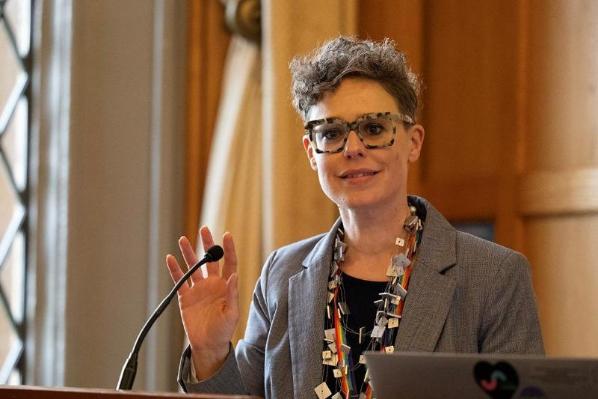BLOG: Our Civic Mission
"Officially seeking University of Sanctuary recognition will allow Queen’s University to consolidate its commitment to embed values of safety, solidarity and empowerment within our communities and educational frameworks."
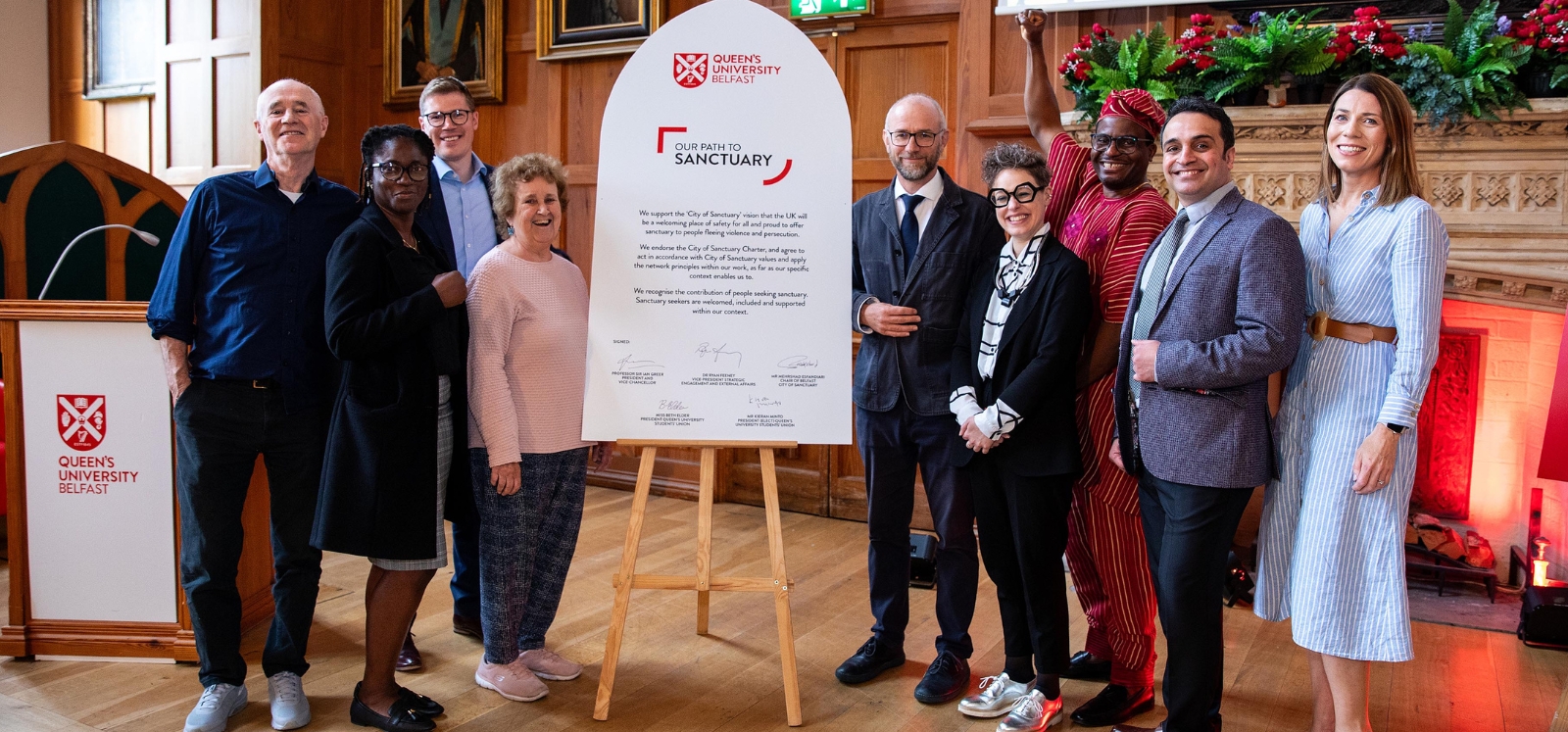
A blog by Dr Federica Ferrieri, Civic Engagement Officer in the Directorate of Civic Engagement and Social Responsibility, Italian tutor in Queen's Open Learning department, Italian Honorary Consul in NI and Vice-President of the Consular Association NI.
As a migrant who was ‘adopted’ by Northern Ireland in 2010, and having dedicated the past decade to teaching languages and contributing to Sanctuary-related initiatives at Queen's, I was looking forward to the launch of Queen’s University Belfast Civic Mission on Thursday 6th June with trepidation.
What we all took part in was a such a joyful morning of heartfelt celebration and honest discussion. A crowded and diverse Great Hall hosted the event’s three main parts – the first two were the reaffirmation of QUB Social Charter, and a lively and thought-provoking Civic Mission in Action panel discussion involving representatives from Belfast Boys Model School, Market Development Association/QCAP, QUB Open Learning Programme (Adult Education), Belfast City of Sanctuary, and The Conservation Volunteers.
Indeed, as Dr Ryan Feeney, Vice-President Strategic Engagement and External Affairs, reminded us all in his speech, “Civic engagement in higher education is this university’s commitment to make its local community a priority and make it part of its purpose”. In the past few years, I have seen Northern Ireland progressively evolving into a more complex, multicultural, and almost kaleidoscopic society, meaning that our commitment to make civic engagement a priority applies to all the local communities, including our migrant, asylum seeker and refugee neighbours.
I cherish the growing diversity and inclusivity within our academic institution. As part of the Civic Engagement Team, but also as the Italian Honorary Consul in Northern Ireland and the Vice-President of the Consular Association NI, I appreciate even more the steps taken to formalise this commitment and anticipate further efforts to enhance our university's ethos of welcome and support.
That’s exactly the reason why I found the third cornerstone of the Civic Mission event the most moving – it was the formal signing of the City of Sanctuary Organisation Pledge. Our Vice-Chancellor, Professor Sir Ian Greer, and Mehrshad Esfandiari, Chair of Belfast City of Sanctuary, came together in a significant gesture of synergy and solidarity, signing a pledge to affirm Queen’s University commitment to the vision of City of Sanctuary by integrating its Charter’s values and principles; recognising the invaluable contributions of Sanctuary seekers; vowing to welcome, include, and support them within our University; and expressing the willingness to engage with City of Sanctuary, embracing further ideas and opportunities to advance a shared vision of sanctuary and solidarity.
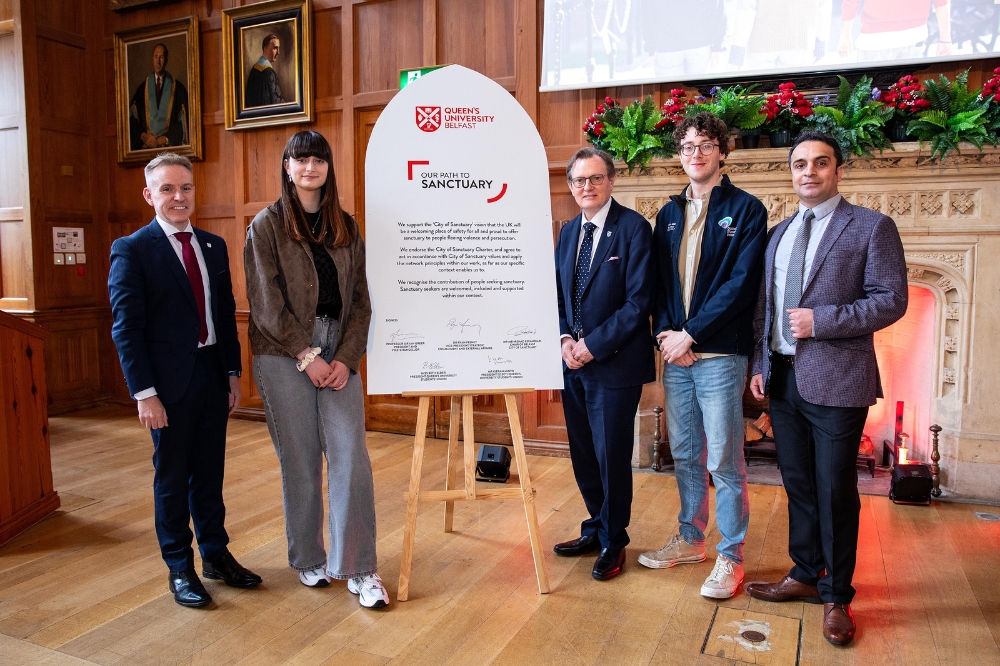
How can we make all this a reality?
Some words and phrases from the initial speeches and the panel discussion resonated with me deeply – Professor Sir Ian Greer, our President and Vice-Chancellor, talked about our Queen’s people’s “commitment to inclusion” as an “essential asset”; and Beth Elder, the Students' Union President, reminded us of the role the student body has played in prompting that “shift in mindset” within Queen’s, a “change brought about holistically, also through difficult conversations”.
“What shall we give in return for so much?” To answer the question posed by the famous motto, we need to work on two fronts – not only creating more opportunities for those who need them the most, but equally forging a work and study place where they feel welcome to come to take those opportunities.
In return for so much, we shall give Sanctuary. But what is it, exactly?
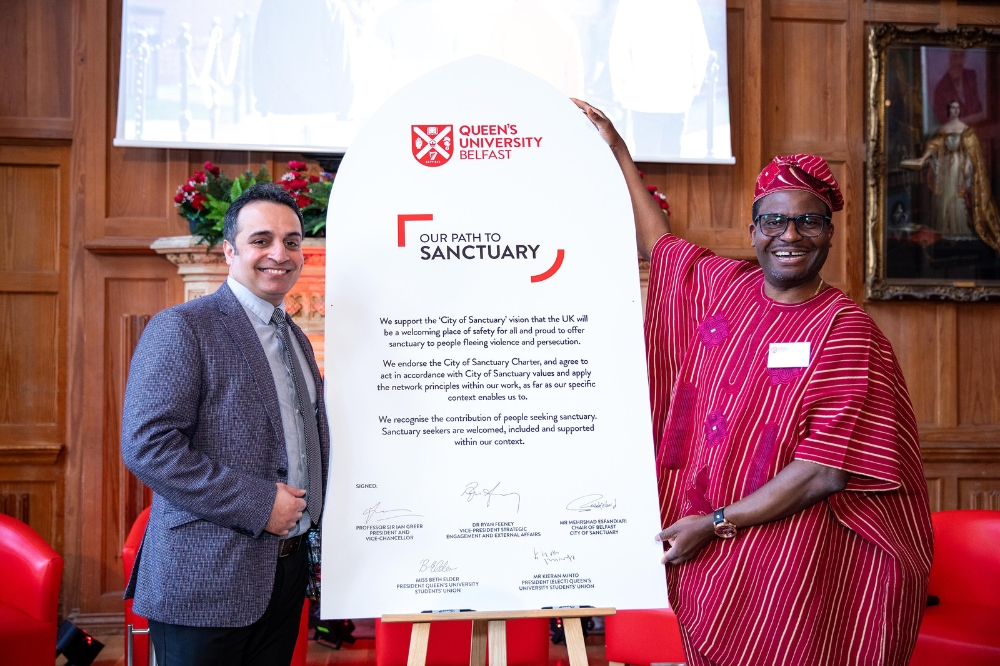
What is Sanctuary?
The University of Sanctuary movement is a global initiative that creates safe and welcoming educational environments for refugees and asylum seekers. By providing access to education, tailored support, and raising awareness, these universities foster inclusivity and promote social justice. They engage in community outreach, offer scholarships, and conduct research on displacement and migration.
There are currently over 30 recognised Universities of Sanctuary in the UK. Officially seeking University of Sanctuary recognition will allow Queen’s University to consolidate its commitment to embed values of safety, solidarity, and empowerment within our communities and educational frameworks, while addressing global displacement, combating xenophobia, and building resilient, compassionate communities.
How Queen’s University is seeking to become a University of Sanctuary
In this process the Civic Engagement Team (in the Civic Engagement and Social Responsibility Directorate) will act as a Sanctuary Hub to showcase relevant initiatives, facilitate contacts and connections within Queen’s but also with external stakeholders, and make sure that our migrant, asylum seeker and refugee communities are consulted and engaged to co-design Sanctuary work and make it relevant first of all to them. Our Team will coordinate the University of Sanctuary application process, but this is very much a collective endeavour encompassing the entire university community. The assistance of all of you will be invaluable in helping us document and promote the remarkable research, projects and opportunities flourishing within Queen’s.
How Sanctuary aligns with Queen’s University’s mission and vision
The formal guidelines of our academic institution already speak the language of Sanctuary. I think, particularly, of one of our Social Charter principles – Equality and social justice – realised, among the others, through “Civic culture and intercultural dialogue” and “Education with social purpose”. ‘Connectivity’ and ‘Respect’ are two of our core values. One of our “Education and Skills” goals in Strategy 2030 is to “Broaden access to Higher Education”; another one, this time in “Social and Civic Responsibility”, is to “Drive social change”. We say that “Universities are uniquely placed to shape the world in which we live”: indeed, by speaking this ‘language of Sanctuary’ we already know and basing our collective actions on Sustainable Development Goal #4 (“Ensure inclusive and equitable quality education and promote lifelong learning opportunities for all”), we will shape a more inclusive, responsible and engaged community.
Where to find more information
The Civic Engagement Team have designed the Our Path to Sanctuary webpage to document Queen's progress with welcoming and supporting people seeking sanctuary. It’s a one-stop shop continuously updated with the latest information and resources, where people can find all relevant information in one place. The webpage includes, among others, reference to:
- the scholarships we offer (two scholarships for asylum seekers per year, one for undergraduates and the other for postgraduates, as well as the Copty scholarships for Palestinian students) and the three CARA fellowships for academics at risk to be advertised soon;
- the free McClay Library six-month Associate Personal Memberships provided to academics or students displaced by conflict seeking sanctuary in Northern Ireland;
- all our QUB internal networks (such as iRISE, the Racial Equity Champions (REC) Network, African Scholars Research Network (AfricanSRN)) along with the external networks we’re currently working with (like Belfast City of Sanctuary and Anaka Women’s Collective).
What has already been happening
As a university and a community, we have already proved our commitment to Sanctuary both on the research and the engagement front. Meaningful research conducted by colleagues in Queen’s focuses on issues affecting migrants and ethnic minorities in Northern Ireland – such as gaps in Education and mental health needs of forcibly displaced people – and avails of collaborations with various organisations like the Migrant and Minority Ethnic Council NI and Belfast City of Sanctuary, to address these issues and create further connections within the community.
It’s been an honour for me, in the past two-three years, to take part as coordinator and website designer in projects like Images of Incoming: A Photovoice project and Translating Age: A project exploring the experiences of older migrant women in Northern Ireland, organised by QUB Open Learning Programme under the direction of Professor Tess Maginess. They have brought together groups of wonderful migrant women based in Northern Ireland, who have used a variety of art forms to express their lived experience, their complex identity, and their sense of belonging to or alienation from this corner of the world where they now live. Professor Sir Ian Greer described the project as “not just a showcase of artistic talent, but a profound sharing of personal histories and collective experiences.”
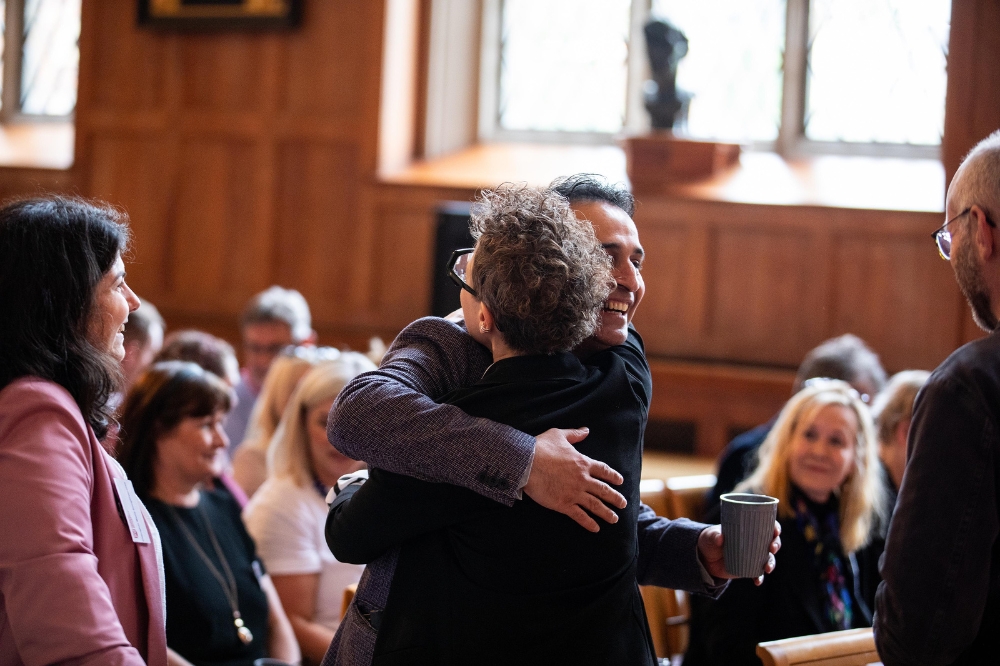
Among the most powerful events I’ve been to in the past few months, I can’t but mention 'Meet the Artist: Alina Gawhary', organised last March at Queen’s for International Women’s Day 2024: it offered an exclusive opportunity not only to engage with Alina’s creative process and admire her artwork, but also to hear her lived experience as an Afghan refugee and human rights activist, narrated in such a gentle, powerful way. I’m still in touch with Alina and I hope to see her again soon in some part of the world.
Your recommendations on the newly-born Queen’s ‘Civic Pillar’
At the Civic Mission Launch event, every attendee received a postcard and was invited to write an idea for the Civic team and hang it on the strings we had placed around the pillar closest to the Great Hall, in the cloisters (hence the 'Civic Pillar' name!).
Once back in the office, I was curious and eager to see what people want to tell us. Some complimented Queen’s University for our commitment to Sanctuary and highlighted its importance (“A place of Sanctuary makes people feel welcome and happy”); someone else said the launch was good but also reminded us that “now the real work begins!” to open our university “as a democratic neighbourhood resource for all disempowered neighbours”; some asked us for more scholarships, and not only for asylum seekers but also for refugees; others for scholarship opportunities for girls based in Afghanistan; some encouraged us all to become ‘local influencers’ to build more inclusive communities; to volunteer more; to give greater focus on disability as a social justice issue; to support ‘invisible’ communities in Northern Ireland like the Albanian or the Kosovan.
So many more comments, requests and ambitions, but what will stay in my mind to “keep me right” is the postcard saying “Keep up the good work. Bottom up approach, town halls, co-design – communities are the experts!”
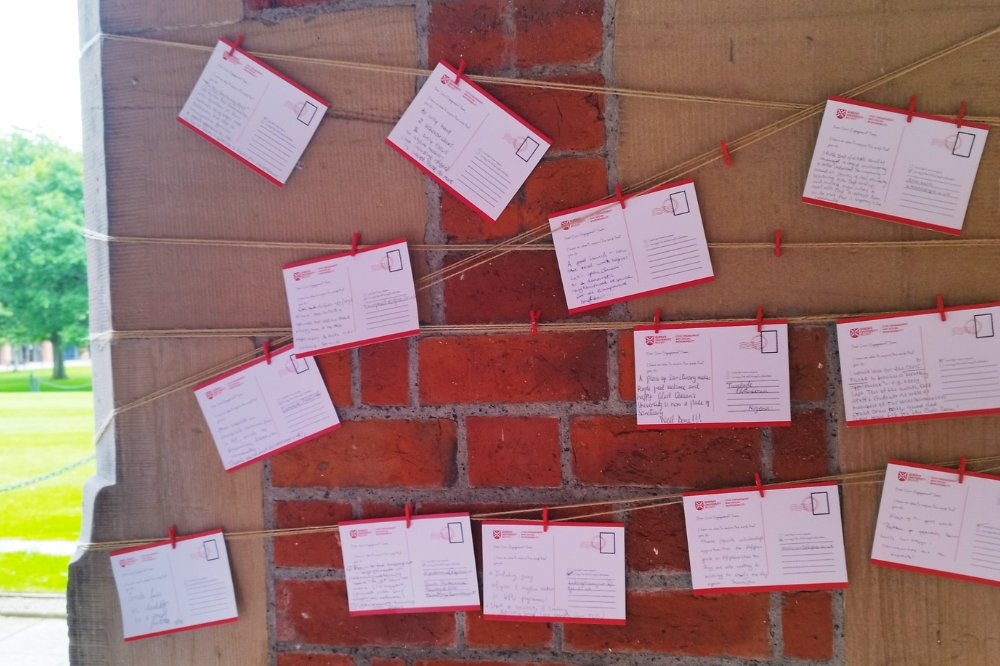
How else you can get involved
If you are a member of Queen's staff or a Queen's student and you have been working with migrant/asylum seeker/refugee communities, please contact me (Civic Engagement Officer, federica.ferrieri@qub.ac.uk): you can be added to Sanctuary Teams, receive regular updates on other colleagues’ Sanctuary activities, and establish meaningful connections to enhance your research and practice while contributing a stone to pave Our Path to Sanctuary.
